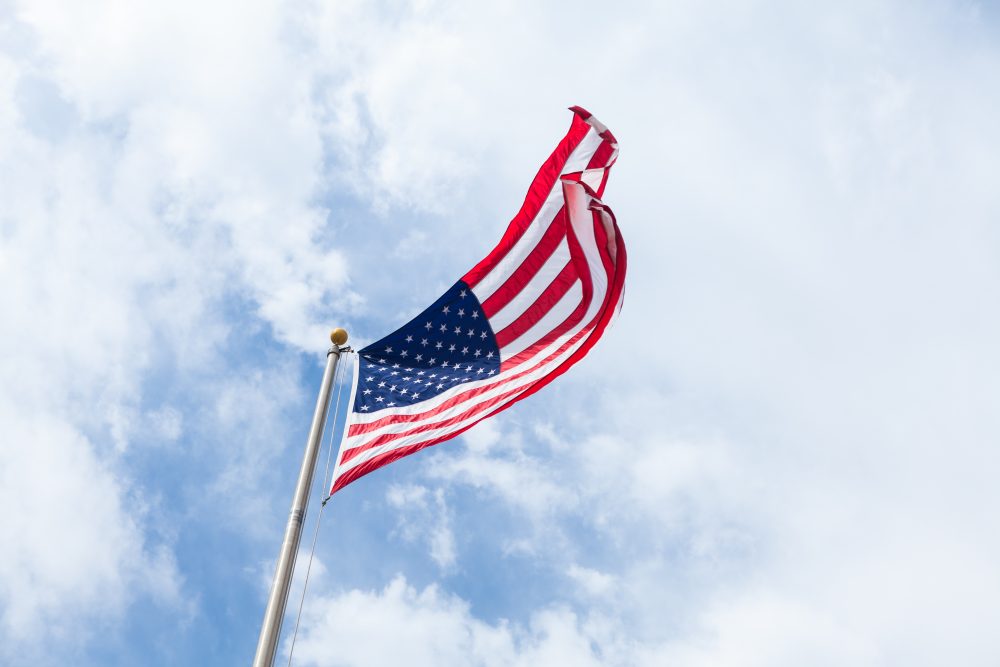Advertisement
Protecting The Flag, Desecrating Freedoms

COMMENTARY
Not long after Donald Trump’s typically uninformed tweet calling for the prosecution and de-naturalization of flag burners, Ohio Congressman Michael Turner introduced the Protect the Flag Act, which would deny essential federal funds to any college or university that bars display of the American flag. He was apparently inspired by the temporary take-down of the flag at Hampshire College after the election. The Republic did not fall, and Hampshire soon resumed raising the flag, but Congressman Turner wants the government to coerce campus flag displays, in the interests of freedom.
The flag is a “symbol of freedom,” and Hampshire College committed a “blatant act of censorship” in taking it down, Turner explained, revealing either his sheer stupidity or a diabolical understanding of Orwellian propaganda.
In fact, Hampshire simply committed a blatant act of speech, obviously. Raising the flag and burning it, trampling it, wearing it or simply lowering it are exercises of free speech, constitutionally protected, as the Supreme Court affirmed in 1989 when it struck down a Texas law criminalizing flag burning.
Congressman Turner is committing a blatant act of attempted censorship. He wants the government to punish private institutions engaging in political speech he finds offensive. The congressman, it seems, is a snowflake.
Prospects for his censorious bill are uncertain. After the Court upheld the right to burn a flag, the House of Representatives passed numerous constitutional amendments that would have permitted the criminalization of flag desecration, but the Senate narrowly rejected all of them. Current Senate Majority Leader Mitch McConnell was among those who opposed the amendments, and he reasserted his support for the rights of flag burners after Trump declared they should be prosecuted. But a statute restricting speech will arouse much less committed opposition than a constitutional amendment. Voting against a bill to “protect” the flag can be politically treacherous, and many members of Congress may choose the path of least offensiveness when confronted with Turner’s bill.
Trump’s reign could conceivably unleash extreme nationalist fervor, identifying protecting the flag with protecting the nation.
Would the Supreme Court strike down this bill if enacted? A majority of justices might hesitate to reverse the 1989 ruling protecting the right to burn the flag, but they might also distinguish imposing civil penalties on institutions for not raising the flag from criminally prosecuting people who disrespect it. The Court does respond to cultural trends, and Trump’s reign could conceivably unleash extreme nationalist fervor, identifying protecting the flag with protecting the nation.
How would the Court rule? Good question.
Free speech cases don’t necessarily divide the Court along the usual liberal/conservative lines. In Texas v. Johnson, for example, the conservative Justice Antonin Scalia voted to protect flag burning and the more liberal Justice John Paul Stevens voted to allow its prosecution. Trump seems likely to nominate a ninth justice who shares his disregard for free speech (and the Senate seems poised to confirm his nominee.) Justice Scalia’s vote protecting the right to desecrate a flag would be replaced by a vote denying it. Still, Chief Justice John Roberts has voted to uphold the right to disseminate deeply offensive speech, including animal crush videos and the vicious anti-gay rhetoric unleashed by the Westboro Baptist Church at military funerals. And Justice Anthony Kennedy is a fairly reliable defender of free speech. He voted to strike down the flag desecration statute in Texas v. Johnson, (and is the only justice still on the Court who participated in that case.)
Advertisement
In his concurring opinion, Kennedy acknowledged the symbolic power of the flag and the dismay occasioned by its desecration. “(T)he flag is constant in expressing beliefs Americans share, beliefs in law and peace and that freedom which sustains the human spirit.” But standing for freedom, the flag stands for the freedom to dissent, most offensively, as Justice Kennedy recognized. “It is poignant but fundamental that the flag protects those who hold it in contempt.”
Compel displays of respect for the flag, and you turn it into a symbol of autocracy — protecting the flag, while desecrating the rights and freedoms it’s supposed to represent.
